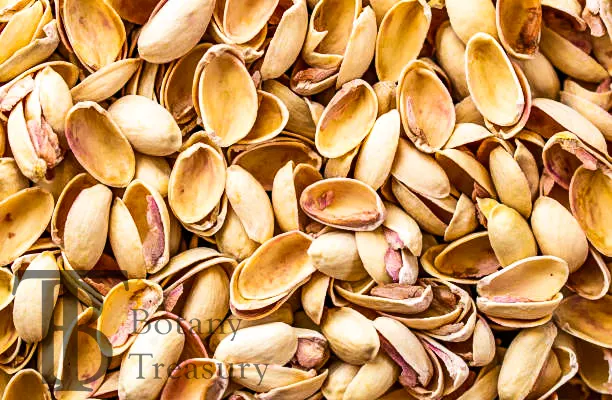
Pistachio Skin
Pistachio is composed of several different parts. The different parts of the pichstachio plant have various applications, with the pistachio skin being particularly valuable due to its high content of antioxidants and potential uses in food, medicine, and agriculture.
Pistachio shells (Hard Skin):
Pistachio shells, also known as pistachio hard skin, are a valuable by-product of pistachio processing. They have various uses and properties that make them a promising source of bioactive compounds and natural antioxidants.
Here are some key points about the application of pistachio shells:
Uses of Pistachio Shells:
- Activated Carbon Production: Pistachio shells can be used to produce activated carbon, which is used for water purification, air purification, and in the food and chemical industries.
- Medicinal Uses: Activated carbon extracted from pistachio shells is used to treat poisoning caused by spoiled food and overuse of medicine. It can also be used to eliminate flatulence, stomach pain, and diarrhea, as well as to whiten teeth.
- Phenolic Compounds: Pistachio skins are rich in phenolic compounds, which have antioxidant properties. These compounds are used in various applications, including food and healthcare sectors.
- Fertilizer and Feed: Pistachio shells can be used as a low-cost feed for livestock and poultry, and they can also be used to produce fertilizer for plants.
- Tar Extraction: The shells can be used to extract tar, which has various industrial applications.
Properties of Pistachio Shells:
- Chemical Composition: Pistachio shells contain crude protein, crude fiber, crude fat, crude ash, nitrogen-free extract, calcium, phosphorus, magnesium, potassium, iron, manganese, copper, and zinc.
- Antioxidant Activity: The antioxidant activity of pistachio skins is higher than that of seeds, making them a valuable source of antioxidants.
Valorization of Agri-Food Waste:
- Extraction of Polyphenols: Microwave-assisted ethanol extraction is an effective method for recovering bioactive phenolic compounds from pistachio hard shells, which can be used as natural antioxidants.
- Column Chromatography: The extracted polyphenols can be fractionated using column chromatography to identify the main antioxidative constituents, such as gallic acid, kaempferol, and pentagalloylglucose.
Conversion into Valuable Products:
- Lignocellulosic Biomass: Pistachio shells can be converted into valuable products like biofuels, bioplastics, and biochemicals, making them a promising lignocellulosic biomass for various industrial applications.
Overall, pistachio shells are a valuable by-product that can be used in various applications, from producing activated carbon and medicinal products to extracting phenolic compounds and converting them into valuable products.
Pistachio hull (external soft shell of pistachio)
Pistachio hull is the pink green, soft leathery, outer covering of the pistachio nut. It is a byproduct of the pistachio processing industry and has been gaining attention as a potential source of valuable bioactive compounds and functional ingredients.
Pistachio hulls are rich in various bioactive compounds, including:
- Polyphenols: Mainly gallic acid, quercetin, cyanidin, catechin, and galloyl compounds
- Polysaccharides: Pistachio hull polysaccharides have shown potential as natural preservatives in meat products.
- Pectin: Pistachio hull can be used as an alternative source of pectin, which can be extracted using conventional or ultrasound-assisted methods.
- Pistachio hull contains high levels of tocopherols, essential oils, and unsaturated fatty acids with antioxidant properties.
- The hull contains beneficial phytochemicals like anacardic acids, carotenoids, chlorophylls, and triterpene acids.
Given its unique composition, pistachio hull has several potential applications including:
- Food and Beverage Additives: Pectin extracted from pistachio hull can be used as a gelling agent, stabilizer, and emulsifier in various food products. Polysaccharides from pistachio hull have shown promise as natural preservatives in meat products, reducing lipid oxidation during storage.
- Nutraceuticals and Dietary Supplements: Pistachio hull extracts are being investigated for their potential health benefits due to their high polyphenol content. It can be used to make sauces, relishes, and chutneys due to its pleasantly acidic taste. Pistachio hull-derived compounds can be incorporated into functional foods and supplements
- Cosmetic and Personal Care Products: Bioactive compounds from pistachio hull can be used in skincare, haircare, and other cosmetic products.
- Agricultural Applications: Pistachio hull extracts may have potential as natural pesticides and fungicides in agriculture. The skin can be used to produce natural fertilizers, promoting sustainable agriculture practices.
- Medicinal Applications: Studies have shown that pistachio hull extracts have antioxidant, cytoprotective, photoprotective, antibacterial, anti-melanogenic, and anti-mutagenic activities. Pistachio hull extracts have been found to inhibit the release of inflammatory mediators like nitric oxide and reactive oxygen species in cell studies.
Overall, pistachio skin is a valuable resource with diverse applications in food, medicine, and environmental sustainability.
Botany Treasury is a leading provider of high-quality pistachio skin. If you are interested in purchasing our pistachio skin, please don’t hesitate to get in touch with us.
Walnut Skin (Shell, Husk)
Walnuts have a shell and a husk. The shell is the hard outer covering that encases the nut, while the husk is the thin, green skin that covers the walnut before it ripens.
Walnut hard shell
Here are some of the key uses:
- Biofuel Production: Walnut shells can be used as a feedstock for the production of biofuels such as bioethanol and biodiesel. The high lignin content of walnut shells makes them an attractive renewable resource for this purpose.
- Adsorbents and Activated Carbon: The porous structure and high carbon content of walnut shells make them suitable for the production of adsorbents and activated carbon, which can be used in water purification, gas separation, and other industrial applications.
- Composite Materials: Walnut shell powder can be used as a filler in the production of wood-based composite materials, such as particleboards, improving their mechanical and thermal properties.
- Chemicals and Biochemicals: The lignocellulosic components of walnut shells can be fractionated and converted into valuable chemicals and biochemicals, such as xylo-oligosaccharides, through processes like autohydrolysis and organosolv fractionation.
- Energy and Fuel: Walnut shells can be used as a renewable energy source, either directly as a solid fuel or through conversion processes like liquefaction to produce liquid fuels. The high calorific value of walnut shells makes them a suitable biomass feedstock for energy applications.
- Industrial Applications: Walnut shell powder has various industrial applications, such as in oil well drilling, cleaning aircraft engines, and polishing jewelry, due to its abrasive properties.
- Cat Litter: Ground walnut shells are used as a sustainable and biodegradable alternative to traditional clay litter for cats.
- Natural Exfoliant: Walnut shell powder can be used as a natural exfoliant to remove dead skin cells and promote a smoother complexion. It is often used as a facial scrub to remove impurities and improve skin texture.
- Hair Loss Prevention: The biotin present in walnut shell powder helps prevent hair loss by promoting healthy hair growth. It is also effective in reducing dandruff and other scalp issues.
- Antioxidant Properties: Walnut shell contains antioxidants that protect the skin from damage caused by free radicals, reducing signs of aging and promoting healthy skin.
- Skin Irritation Relief: The antioxidants in walnut shell can help soothe and calm irritated skin, making it a popular ingredient in skincare products
